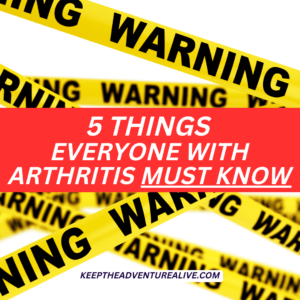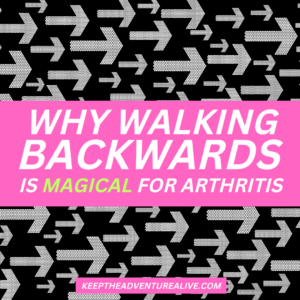Does your knee clicking make you think something is wrong with your knee? Are you trying to find out what is causing it and how to fix it? Well you are in the right spot. When hearing a knee click, it can be associated with knee osteoarthritis, previous knee injuries, or simply if you are hypermobile (meaning extra flexible). Not all knee clicking is dangerous. In fact, most of the time noisy knees are harmless. But it’s important to know what’s going on just to make sure!
This article may contain affliate links that provide me with a small compensation at no extra cost to you!
Wanting more information when your knee starts making foreign noises is very common, especially if you have knee osteoarthritis or if you begin to notice happening more frequently.
I just received this question in my private Facebook group for those with osteoarthritis and thought I’d elaborate on this answer.

To be clear knee clicking does not automatically mean you have knee osteoarthritis. There are many things that can lead to your knee becoming more noisy but it can commonly be associated with osteoarthritis. It doesn’t have to be a new normal though, there are a few things you can do to minimize the noise.
But first, you have to understand the potential cause of your knee clicking. Let’s look at why knees are making noise.
Is knee clicking dangerous?
In order to decipher if knee clicking is dangerous, you have to look at a few things. There are certain circumstances where if your knee is making a popping, crunching, or clicking noise and it’s associated with pain- it may need further assessment.
If you are noticing any of these noises in your knee and they aren’t associated with pain- then you may be in the clear!
If your noises start occurring more frequently, your joint may be trying to get you to pay attention. Increasing frequency could be a sign of unhappy muscles, unhappy tendons (connected muscle to bone), unhappy ligaments, or even an unhappy knee cap. Most of these can be addressed likely by fixing strength imbalances you may have and getting you to move better. A physical therapist can usually help with this.
There are a few questions you need to ask yourself first to decide if the cracking, crunching, clicking noises are dangerous.
- Have you had a recent knee injury where you heard a pop?
- Do you have pain associated with the noises, meaning as the noises happen you experience pain?
- Are your noises happening more frequently?
- Did you recently have a knee surgery?
- Does it feel like grinding, grating, or catching?
If you answered yes to any of these questions, your knee clicking may need a further look. When knee clicking is associated with pain, it could be a sign of an underlying problem that needs to be addressed.
If you notice a popping noise when you are doing something, say exercising, playing a sport, or simply getting out of the car- it could be a sign of ligament injury or a meniscus tear which will need further assessment by your primary care doctor.
If your knee clicking is increasing in frequency, you may have painful muscles or injured ligaments (the bands that connect bones together) that may be trying to tell you something with this noise! It isn’t always a serious problem but could lead to further injury if not assessed.
Noises after surgery can be normal but they can also mean there may be an issue with the hardware that may be in your knee. Monitor it and notify your doctor or surgeon if it keeps happening and also if it is associated with pain.
Grinding, grating, and catching may be a sign that something is going on in your knee cap. Now, deep breath- it’s not always serious. Conditions like patellofemoral pain syndrome and chondromalacia patella can be associated with noises.
Essentially if your knee cap is not tracking or moving in the groove it’s supposed to, it can cause noises and pain from irritation. Lots of times these conditions can be helped with the right exercise program. Muscles and tendons can help get the kneecap back into place.
If you answered NO to the above questions...
You may not be out of the woods yet so keep reading.
Knee clicking, cracking, crunching, and other noises can actually be normal (although your joint making weird noises may not exactly seem normal). Especially without the presence of pain, these foreign noises in your knee may not be an issue.
There are lots of theories made my researchers on why the knees crack and creak but a consensus hasn’t really been reached.
One of the more common theories is described below.
Changes in joint pressure can cause tiny bubbles of gas to slowly form in the joints. When these gas bubbles are formed quickly, they make a popping sound. This type of air-mediated popping can also occur in joints other than the knee, and is more prevalent in the knuckle joints of the hands.) This type of noise, caused by air buildup in the joint, is sporadic in nature
Song et al 2018
In this scenario described above, knee clicking likely is not dangerous- it’s just your joint doing it’s thing.
There are other theories that exist of why this knee clicking and other noises are happening, especially in a seemingly healthy knee.
Here are few questions to ask yourself to help find out if your knee noises are actually normal:
- Do you have knee osteoarthritis?
- Do you notice the noises only in certain movements such as squats or stairs?
- Do you experience any consistent knee pain? (i.e at least 50-75% of the time you are awake for at least 3 consecutive months?)
- Have you recently increased your activity?
- Are you flexible?
If you answered yes to any of these questions, your knee noises may be harmless but you should take a closer look.
If you have knee osteoarthritis, knee noises, also termed crepitus, can be common. This is because as your joint gets irritated with inflammation, you may get small pieces of cartilage floating around or extra fluid that is pressing on other structures, leading to things rubbing together.
To help combat these noises, work on reducing inflammation. The best ways to do this are increase your anti-inflammatory foods, explore supplements like Turmeric (my favorite brand here!), and find movement that makes your joints feel good.
If you aren’t sure where to get started, check out my free 4 day, arthritis friendly, workout challenge below.
If you notice knee clicking only during certain movements, there may be something off about the way you are doing said movement. A physical therapist can likely help you see what is going on.
For example, during stairs, knee clicking is common. It may be because certain muscles are tighter or weaker than others, lack of stability in the joint, or even poor balance. All of these can alter the way your joint works.
Noises associated with chronic knee pain may be tied to the beginning stages of knee osteoarthritis but usually only if you are also experiencing other symptoms that can be found here.
Recent increases in activity such as suddenly increasing walking distance, steep hiking, or increased workout intensity could lead to overworked muscles and irritation. This can lead to tight tendons (think thigh muscles, IT band, etc) which can alter the way your joint moves.
When you alter the way your joint moves, certain things in your knee may be rubbing together leading to the noises. Gradually increasing activity levels instead can help to prevent this.
If you are very flexible, also known as hypermobile, you could be at risk for some knee sounds. This again, doesn’t necessarily mean it’s anything serious. According to the research, if your knee cap moves more than it should, this can lead to some knee noises. Strengthening can help diminish these noises and support your kneecap.
What are the best exercises for knee clicking?
First you have to figure out what is causing your knee clicking from one of the options above. Many times, learning how to use other muscles such as your glutes and hamstrings can decrease knee cracking noises. Improving single leg balance and knee stability can also be very important, especially if your kneecap is moving in ways it shouldn’t be.
Here are 3 example exercises you can try but please note, these will not work for all knee sounds. You must find the cause then address it appropriately.
Single leg deadlift
This exercise tackles balance but also helps to work your hamstrings- that may not get worked very often if walking is your primary form of exercise. You need a well rounded and supported knee to reduce noises. You also need a balanced knee too!
This is a higher level balance exercise so choose the best modification, you can find other balance exercises here.
Try for 10-15 reps, 2-3 times/day of the appropriate modification for you.
Lateral step overs
If you aren’t moving sideways, you may be surprised at how powerful a simple movement can be. Moving sideways can help to use different hip muscles that may not get much work during daily life.
These muscles are important on the outsides of your hips because they can make a big difference to your knee! Starting with this basic exercise, try to complete 20-30 reps. You can make it harder as you are able by increasing speed or the height of the object.
Lateral box step over
Knee crunching can be common when going up or down the stairs. To help combat that, try doing a sideways step over 8-10 reps, 2-3 times per day. The higher the step, the harder it will be. You can get the step stool I am using here.
Conclusion:
Knee noises may or may not be harmful depending on the cause. Knee clicking and cracking may sound scary at first but it could be totally harmless.
Many times, improving your mobility, increasing your strength, and adding variety to your movement can help to reduce knee sounds. They may not completely go away though and that is actually okay.
If your knee noises are coming from something more serious such as an injury, it is imperative that your knee(s) checked out.
If there isn’t any pain associated, you may be surprised at how effective movement can be at reducing the magnitude of these sounds. Get started with the 4 Day Arthritis Friendly Workout Challenge to start feeling (and hearing!) relief.
References:
Song, Sang Jun et al. “Noise around the Knee.” Clinics in orthopedic surgery vol. 10,1 (2018): 1-8. doi:10.4055/cios.2018.10.1.1
Alyssa Kuhn
Disclaimer: This post is for general informational purposes only. It should not be used to self-diagnose and it is not a substitute for a medical exam, cure, treatment, diagnosis, and prescription or recommendation. It does not create a doctor-patient relationship between Dr. Kuhn and you. You should not make any change in your health regimen or diet before first consulting a physician and obtaining a medical exam, diagnosis, and recommendation. Move Well Age Well, LLC and Dr. Alyssa Kuhn, PT, DPT are not liable or responsible for any advice, course of treatment, diagnosis or any conclusions drawn, services or product you obtain through this video or site.

If you are looking to regain your active life but are unsure where to start, join the revolutionary membership, Adventurers for Life. This is a step-by-step path that not only will help you find pain relief but will help you unlock adventure. You’ll get workouts, tests to pass to make sure you are on the right track, community events and MORE.




